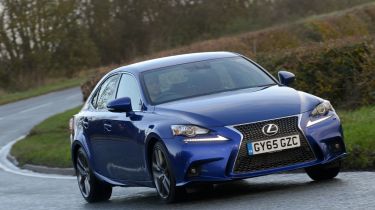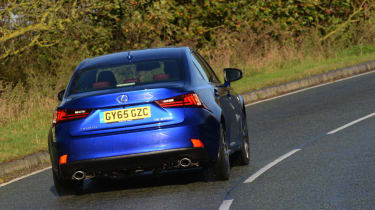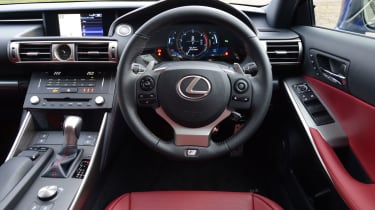Lexus IS 200t F Sport 2015 review
Lexus is known for hybrids but can the exclusively petrol powered IS 200t bring its compact exec closer to the BMW 3 Series?

The diesel-engined Lexus is long gone. As a result, if you don’t fancy the IS 300h hybrid, this 2.0-litre petrol is your only choice. But variety isn’t always the spice of life. We prefer the IS 300h’s hushed drivetrain and more relaxed nature – despite the flawed CVT automatic gearbox. A BMW 3 Series remains more fun to drive, while rivals like the new Audi A4 are considerably more economical.
Lexus committed itself to a hybrid future a long time ago, disregarding Europe’s demand for dirty diesels. The brand has seen success in Asia and the US, and hopes it can convince those on this side of the pond that electrification is the key to driving satisfaction.
However, in an attempt at offering buyers a bit more variety, Lexus is now selling a pure petrol version badged IS 200t. It costs exactly £1,000 less than the equivalent hybrid, uses a 242bhp 2.0-litre turbocharged engine and comes with to a conventional eight-speed automatic transmission. That should hush the CVT sceptics, then.
Sorry, not so fast. On the road, the gearbox feels lethargic and rather sluggish next to BMW’s brilliant ZF and Audi’s dual-clutch S tronic. The 200t has more power than both the BMW 320i and Audi A4 2.0 TFSI 190, yet manages to feel far less urgent in normal driving.
Used - available now

2023 Audi
Q4 Sportback e-tron
54,526 milesAutomaticElectric
Cash £23,363
2022 Kia
Niro
18,315 milesAutomaticPetrol1.6L
Cash £17,900
2023 Nissan
Juke
40,858 milesManualPetrol1.0L
Cash £12,287
2022 Volkswagen
T-Roc
36,779 milesAutomaticPetrol1.5L
Cash £18,600It constantly struggles to find the desired gear and can leave you stranded at roundabouts and junctions while it desperately tries to drop a couple of cogs. At least the CVT setup in the IS 300h does what it says on the tin, continually varying its ratios to provide a more instantaneous throttle response.
It’s not as well resolved to drive as a 3 Series either. Our F Sport test car came with big 18-inch alloy wheels and stiffened suspension, detracting somewhat from the relaxed and cosseting nature of other Lexus models. That said, there’s loads of grip from the wide rear tyres, and body roll is kept in check. The steering is well-weighted too.
Unfortunately, the IS 200t can’t compete on running costs, either. It not only loses out to its similarly priced hybrid sibling, it’s also thirstier than its closest rivals. The IS 300h emits just 107g/km in F Sport trim, while the turbo petrol in this car emits a frankly disappointing 167g/km. That means annual VED of £205 per year, and crucially for this market – a quite significant company car tax bill. A comparable BMW 320i M Sport emits 134g/km, while a new Audi A4 slashes this to 119g/km – even on the bigger S line alloy wheels.
The interior is beautifully crafted though, and F Sport cars come in on par with similarly specced competitors.










